Many people have expressed to me great sadness over not being able to ride a beloved horse anymore. In many cases, it’s not just that they want to ride, they want to ride their own horse, whom they have spent countless hours riding, who is no longer rideable for health or other reasons.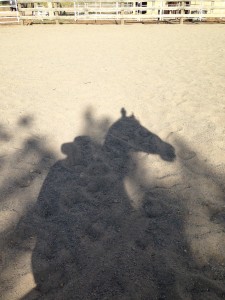
It may also be the person can’t ride for health reasons, both creating sadness at the loss of this wonderful union.
In response, I used to say, well, we have many liberty exercises you can do with your horse. And that is all well and good. Yes, but I still miss riding my horse….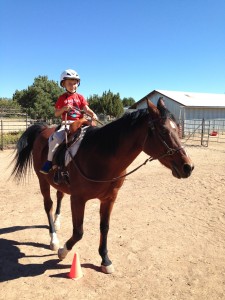
So it occurred to me that we need to acknowledge that grief over not being able to ride that special horse any more. Whether it’s a temporary or final not riding, it’s still something that is extremely painful for many people.
Part of this pain is because you have spent years getting your body and the horse’s body to become one. The relationship takes time, in and out of the saddle.
In addition, the horse feels it too. The horse feels his worth tied up in some way with the riding, even though he knows his person loves him. He enjoys his riding time with you and the oneness. He knows there are horses in the world who are not so lucky, whose owners will find them other homes if they’re unrideable. And those homes may not be so kind or the horse may be destroyed.
All horses know this. The healing of this loss takes place then with both horse and owner. As I have traveled this road myself a few times, I know what it feels like. With older horses, the loss comes on gradually. My mare Opal was diagnosed with malignant melanoma at 8 years, went on to do some endurance rides, and retired at 12, and was ridden lightly until she was 14. One day my gelding Khami could trot for 25 miles, then his stamina began to wane and he began to colic more often, and so he was retired from competition. From there on he enjoyed light trail riding, and eventually a few months before his death last year, he made it clear that going out on the trail worried him. He was a little wobbly.
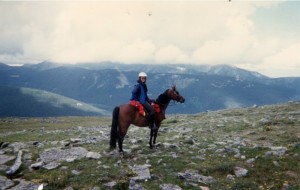
The last time I rode him, he gave me a newsreel of images from our riding life together, the miles of trails, the hours of camping, the joy we shared in each other’s company. It brought tears to my eyes, just before he shied at something. I dismounted and walked him in, feeling the bond of our centaur time as though it was just happening. What a gift he gave me, that I carry forward into every moment of every day..
Recognizing the signs is important. Knowing when the horse is unsafe to ride, perhaps he is worried about something in his body, the saddle no longer fits, the whole scenario doesn’t work for him – this is an essential part of the centaur relationship, whether you are in the saddle or out of it.
Physical challenges like my Opal’s cancer can render a horse unrideable early on in life, which is hard for people to take. My gelding Patches has been one of those who has suffered a lot of illnesses, lameness, back soreness, behavioral challenges – all of which he has come through with patience and love, and is currently rideable. I’m so thankful just to sit on his back for however long our season of riding is.
Riding at its best is the centaur relationship, a place we come to hopefully after trust building. Sometimes a horse isn’t able to take us there, and that needs to be honored also. I have known horses so fearful, or with an inability to stay in the moment with the rider to the extent they are unsafe to ride. We can work with the fear to the extent that the animal is able, on the ground, but it is unsafe to climb into the saddle.
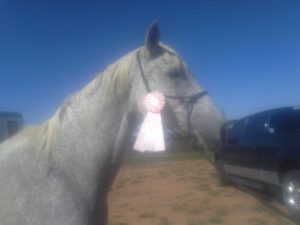
The other thing I’ve found is helpful with a horse you can’t ride or want to exercise in some way, is ponying. We pony Patches a lot, partly because he doesn’t like to be left behind. He gets some great exercise and gets to be with his mares.
Older horses love to receive special attention, an example is in the form of fun activities like getting a food hunt of some kind. The other day, I put out apples from the nearby trees in special places in the pasture and helped Zuzka find them. She was thrilled. She also likes to be the one to find them first.
Recently, my friend Tina took her gelding, Oliver, to a play day where he won fifth place in an obstacle course event. She was never so happy to get a fifth place – Oliver was a rescue whom nobody could get near a few years ago. For a year she has been doing liberty work with him, and he is now engaging with her more deeply and his sense of humor has emerged! (see more on Oliver in The spectrum for horse and human)
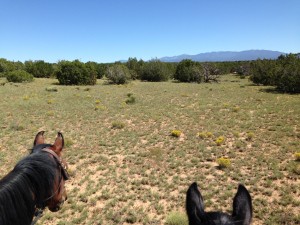
With the proper support, we can move through grief without burdening our equine partners. We can bring them along on our journey, help them with their journey and not abandon them because they can’t perform as they used to.
One thing that helps is to have another horse. A rideable horse relieves the pressure put on the one who can no longer be ridden, and allows you to spend quality time with the other one without dumping your emotional baggage on him.
The riding horse gradually becomes the one you know intimately, as your older horse is. The relationship will be different as they all are, but you will grow to appreciate one another for your gifts and frailties, and depend on one another, ideally, when things become difficult.
If you can’t ride again because of your own health, then perhaps it is time to find other ways to spend time with your horses. Liberty Foundations provides numerous delightful ways, such as the apple hunt I described above, to share time and deepen your already lovely bond. Walks online or offline with your horses can be really fun and show you what horses are really interested in, and build your own curiosity. These moments shared with your horse will benefit and bring joy to both of you.
If you don’t have horses anymore, horse shelters need knowledgeable volunteers to give TLC to horses who are looking for homes. I know it isn’t your own horse you’re giving to, but perhaps the experience can give back to you in a way.
The ability to let go of how things have been in the past, and embrace the present, is a valuable gift, what I often refer to as “self-correction,” where once acknowledged, we move forward out of our pain, to a place of greater understanding and acceptance.
Related links:
What if I can’t ride my horse?
When should I stop riding my older horse?
The spectrum for horse and human
(c) Susan Smith, Horses at Liberty Foundation Training, Equine Body Balance (TM)
Please see my
Events for information on upcoming clinics and workshops.



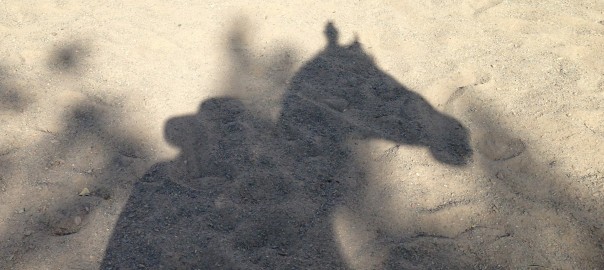
❤️